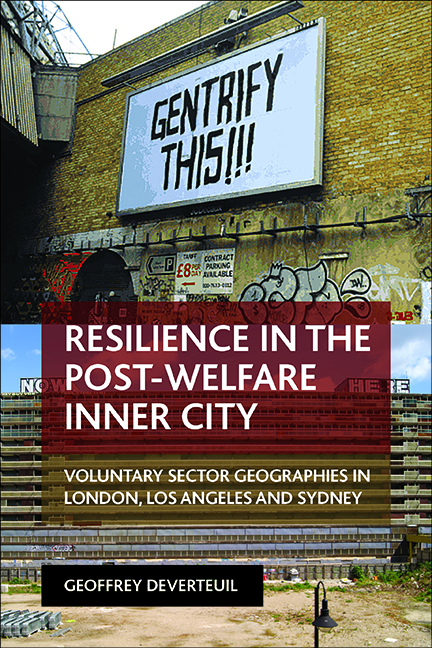 Resilience in the Post-Welfare Inner City
Resilience in the Post-Welfare Inner City Book contents
- Frontmatter
- Dedication
- Contents
- List of tables and figures
- About the author
- Acknowledgements
- Preface
- Part One Introducing resilience in the post-welfare inner city: conceptual and methodological considerations
- Part Two Case studies: spatial and social resilience in London, Los Angeles and Sydney
- Part Three Conclusions, critical resilience, commons and austerity
- References
- Index
one - Introduction
Published online by Cambridge University Press: 10 March 2022
- Frontmatter
- Dedication
- Contents
- List of tables and figures
- About the author
- Acknowledgements
- Preface
- Part One Introducing resilience in the post-welfare inner city: conceptual and methodological considerations
- Part Two Case studies: spatial and social resilience in London, Los Angeles and Sydney
- Part Three Conclusions, critical resilience, commons and austerity
- References
- Index
Summary
This chapter begins with crucial extralocal contexts: the Keynesian welfare state and its demise, prefiguring the focus on its stranded residuals within a context of consolidating yet incomplete neoliberalism and the uneven post-welfare city. As Esping-Andersen (1990: 3) noted, the welfare state seeks to de-commodify social goods and ‘permit people to make their living standards independent of pure market forces’. At the same time, it is by nature a stratifying system to those unable or unwilling to avail themselves of the labour market, as Wacquant (1999: 1642) emphasised:
for alongside market forces, welfare states are major producers and shapers of urban inequality and marginality. States not only deploy programmes and policies designed to ‘mop up’ the most glaring consequences of poverty and to cushion (or not) its social and spatial impact. They also help to determine who gets relegated, how, where and for how long. States are major engines of stratification in their own right and nowhere more so than at the bottom of the socio-spatial order … they provide or preclude access to adequate schooling and job training; they set conditions for labour market entry and exit via administrative rules for hiring, firing and retirement; they distribute (or fail to distribute) basic subsistence goods, such as housing and supplementary income; they actively support or hinder certain family and household arrangements; and they codetermine both the material intensity and the geographical exclusivity and density of misery through a welter of administrative and fiscal schemes.
At least in the Global North, the Keynesian period (1945–80) is now seen as a uniquely golden age, ‘… the culmination of a centuries-old struggle for social protection and security in the industrialised countries. It may justly be regarded as one of their proudest achievements in the post-war period’ (Ghai, 1996: vii). At the urban scale, the Keynesian period was associated with expanding collective consumption underwritten by the state (Castells 1977; 1983). Collective consumption revolved around what is termed publicly provided ‘collective goods’ such as education, health and social services. All of them ‘improve the well-being of the community and would not be supplied by markets because their benefits are non-excludable, but similar to collective-implementation goods, they are supplied only through active forms of cooperation’ (Hall & Lamont, 2013: 19).
- Type
- Chapter
- Information
- Resilience in the Post-Welfare Inner CityVoluntary Sector Geographies in London, Los Angeles and Sydney, pp. 3 - 22Publisher: Bristol University PressPrint publication year: 2015


